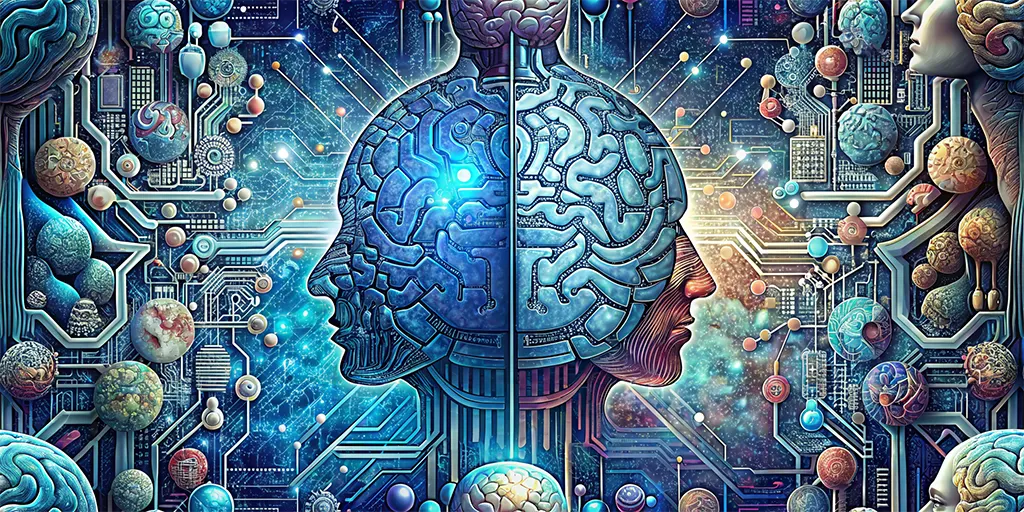Trends for the latter half of 2024 and into 2025 suggest a shift towards simplicity. A certain generic simplicity. It’s not quite minimalism but a type of recitation. Some type of repetition of sometimes bad information and other times poor substitutions for creativity. AI hallucinations. By the sheer magnitude of AI generated copy circulating the past couple of years, it seems that this is the case for writing and other creative fields like web/graphic design. Yes, I used a generative AI for the article header image.
Psychology without Philosophy
The influence of AI is definitely a double-edged sword. While it streamlines processes, it also presents myriad challenges, particularly in design and content creation. In the short term, AI’s content generation capabilities are leading to a saturation of generic designs and copy, diminishing the uniqueness and impact of creative content. It’s easy to see how the human experience is slowly being drowned out as the market looks to cheaper, robotic methods of content generation. From some perspectives, it has, so far, resulted in a decline of content quality, and has forced the creative market to adjust to the watered-down influx of AI-generated materials.
Ephemeral Content
Maybe the idea of art as something as watered down and euphemistic the word content is wrong anyway. I’ve never liked how that word has been used over past couple of decades. It seems disingenuous and lacks meaning. It seems like self-publishing got big on itself and adopted self-ingratiating language. Maybe we bought-in too willingly on the language that internet super corporations wanted us to adopt to justify their existence in our lives. Afterall, on the internet everyone can be an influencer. Just five bullet points in a social media post separate you from the success you deserve!
I have a feeling that these perceptions of stagnation won’t last forever. There’s too much money in it. Too much has been invested to give up control to machine learning. Either people will recognize it, or AI will, simply, improve beyond the cliches apparent in its juvenile overuse.
If you pay close attention to what you see in the media, and emails from colleagues, you’ll see the generated words. Overly fluffy language using too many overly descriptive, almost pretentious multi-syllabic words. Those long words that don’t make you sound smarter. Orwell had it right when he said, “Never use a long word where a short one will do”. LLM’s (Large Language Models) don’t know this despite their access to massive libraries of human work.
Who’s Training These Things?
Maybe it’s because the material that the engineers are training the bots with is what they think sounds smart. Maybe their highly focused degrees didn’t expose them to enough literature and the wisdom of the arts and humanities. It could be that the whole system is skewed towards business metrics of productivity and not enough towards well rounded outcomes from well-rounded education. They think it’s all about sounding smart by hammering on corny sounding marketing speak rather than explaining things clearly with accessible language.
Sounding amateurish is what AI is good at. If you ask it to write an article without any parameters, it spits out something with heavy-handed use of those old high school English vocabulary books. If you ask it to write something other than an outline for what you, the human should be writing yourself, then you aren’t using the tool properly. Asking AI to write an article for you with parameters helps a little but it takes time and training to avoid the now common AI cliches and overuse of puffed up “smart” sounding phrases.
We are currently in the process of acknowledging the good uses of the tool. The productivity through the use of AI in all types of use cases is proving to be a market driver. Everyone is adding AI to their platform. Most of the time it’s useless. Some of the time, with the correct massaging, AI can spit out something usable. The example I’m thinking of specifically are the premium AI features on LinkedIn.
Street Corner Preachers
While it’s something cool in theory, the results are absurdly lacking. Tools for data analysis can be useful but ask it to write a post or to write a biography and it spits out some really ugly shit. Language nobody would use to describe simple job descriptions are plastered all over the site. And, while it’s not necessarily the LinkedIn AI, feeds are filled with posts that shout from virtual street corners, “AI tools you should be using to gain followers and find success”. Virtual carnival barkers and snake oil salesman as thought leaders. AI spam becomes marketable genius. A lot of copy and pasting. Maybe that’s what people want. Something that doesn’t make them think too much. Content that tells them they too can find success.
I have found more than one promising success. Videos of men sitting at computers sharing their screen displaying how to copy Pinterest posts, run them through an AI, “make some adjustments” to make it your own, and paste it onto your feed. Generic career advice articles regurgitated over and over. Simply use an AI tool for every step! Like a cassette tape that’s been used to record too many songs, too many times, the fidelity is lost. It feels like we’re subjected to Vogon poetry on repeat.
Victim Market
AI isn’t just a path to the mediocrity I describe. I already mentioned how it does have its benefits. Those benefits are feeding some mouths, but according to the posts on LinkedIn, it isn’t the mouths of creatives. There is some truth to the anguish. Right now, with some of the latest employment stats, copy writers are losing. Graphic designers are losing. Web designers and coders are losing. Not just a little bit. Available work has dried up. People are being laid off.
I can see why they’ve soured about the whole thing and why the reactions are what they are. But it can and does seem a little overblown. Maybe it’s just the rage bait and the commanding presence of the bullhorn they carry around on social media. There’s no shortage of sour, depressed people. Afterall, what social media has shown the world is that there is a huge market for victimization.
However, losing to the creative mediocrity that I mentioned earlier is heart breaking. Authenticity is losing out to repetitive, copied, and garbled AI speak. I feel like it’s possible this is short term. It has lately been said several times, people aren’t necessarily losing to AI, they’re losing to people using AI. So, like a lot of what I’ve written about, the common thread remains. The human element isn’t just a euphemism. I see some room for optimism though. The phase of the generic multitude won’t last forever. There will still be room for artists.
There’s always been an overabundance of generic consumerism. And thoughtful artists have always coexisted in the same spaces. Technology has disrupted the arts for decades if not centuries. Maybe the difference now is the sheer amount of dollars invested.
Jobs
“The overall arts economy represented 4.4 percent of the U.S. GDP in 2021, surpassing $1.0 trillion—a new high-water mark!” That’s an absurdly large amount of money. The market is still there in 2024. The share of that $1 trillion for the actual artists may have dwindled a bit since 2021 but it’s hard to say. Someone is getting paid. Millions of people making commercial art are getting paid. Our society gives a lot of value to and emphasis on commercial art.
A huge amount of value. There’s enough money invested for there to be a recovery after an AI dip for what appears to be the relatively small number of unemployed creatives in the US. In 2021, just under 4.9 million workers were employed in arts and cultural goods and services production. This number is slightly lower than the pre-pandemic level in 2019 but higher than the 2020 level. In 2024 that number has gone up to 5.2 million. So, there is hope… and huge growth.
Compare that with the current AI market. At $200 billion, it’s expected to grow to around $1.8 trillion by 2030. Where will the arts be in 2030? Will the growth of AI displace the current $1 trillion arts market? I don’t think it’s likely unless humans suddenly lose interest in originality completely. There will always be a need for interpretations of the contemporary and the past. To me, it’s inevitable that both will coexist.
With those massive dollar numbers as a consideration, and although deliberation and a slow-moving US legislative system is by design, legislation will most likely come sooner than later. The market will dictate and force that. I’m curious what companies like Nvidia will be worth in 2030. Where will competition emerge? Will their massive growth continue?
Battle of Good vs. Evil
All that said, and job market consideration aside, I’ve used LLM’s to help me scaffold/outline articles. I find it to be helpful to prompt myself with ideas and to add simple illustrations to the headers of posts on this blog. I suppose out of work illustrators would find that use to be unethical. Maybe I’ve fallen victim to the productivity fever. No one is safe!
But really, it does make me more productive in several ways and I won’t apologize for that. AI is easy to use as a tool for good rather than evil. What’s unfortunate is, it’s even easier to use it unethically, copying and pasting on a whim. This is all a long digression. I wanted to write about where trends in web design are going. Where the next year or so will send the field of web design. All that is lost in a bit of a rant now but maybe I’ll get to it later this week.
So, despite all the ranting I do as I sometimes float in the sea of bitterness, I still see positivity on distant horizons. Sometimes all it takes is observing some earnest positivity. People still want to help each other, and I see kindness and support pouring out of the posts announcing early ends to creative careers. I can be a grump and sometimes look on the darker side of things. Sometimes I might see a reflection of bitterness in myself. It’s pretty obvious that there’s goodness out there and kind people exist and genuinely do want to help. Be one of the positive ones. Reach out and share some kind words with someone who is grieving a job loss or the anxiety of a yearlong job search. The seas are rough right now.


